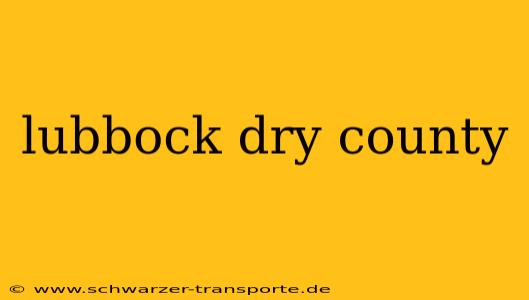Meta Description: Lubbock County, Texas, has unique alcohol laws. This guide explores its dry status, exceptions, and implications for residents and visitors. Learn about permitted sales, consumption, and transportation of alcohol in Lubbock. Discover the history, current regulations, and potential future changes to the county's alcohol laws.
Understanding Lubbock's Dry Status
Lubbock County, Texas, operates under a unique system regarding alcohol sales. While not entirely "dry" in the strictest sense, it maintains significant restrictions on the sale of alcoholic beverages. This means that the sale of alcoholic beverages within the county's limits is far more regulated than in wet counties. This article will delve into the specifics of these regulations.
A History of Prohibition and its Lingering Effects
Lubbock County's current alcohol laws are a legacy of its historical context. The area has a long history of temperance movements influencing local policies. These historical regulations shaped the current system, a blend of "dry" and "wet" characteristics.
Where Alcohol Can Be Purchased in Lubbock County
Despite the county's restrictions, several exceptions allow for legal alcohol sales within Lubbock County. These loopholes are crucial for understanding the local alcohol landscape.
Private Clubs and Certain Establishments
Private clubs and certain permitted establishments, such as restaurants and bars holding the proper licenses, can legally sell alcoholic beverages. These establishments must adhere to specific regulations to maintain their licenses. The process of obtaining these licenses is often rigorous.
Package Stores and Supermarkets (with Restrictions)
The sale of alcoholic beverages in package stores and supermarkets is largely restricted. While some establishments may be permitted to sell alcohol, it's often only certain types and under specific circumstances. Many grocery stores may sell beer but may not sell liquor.
Local Breweries and Wineries
Local breweries and wineries within Lubbock County can sell their products directly to consumers on-site. This helps support the local economy and offers a unique experience to visitors. Their sales, however, are strictly regulated and monitored by the Texas Alcoholic Beverage Commission (TABC).
Transportation and Consumption of Alcohol
Understanding the rules surrounding the transportation and consumption of alcohol is crucial for both residents and visitors. These regulations can be complex and easily misunderstood.
Transportation Laws
Transporting alcohol purchased legally within Lubbock County (from a permitted establishment) is generally permitted, provided it's in a sealed container. However, public intoxication remains illegal and carries penalties. It's advisable to research local regulations to avoid potential issues.
Public Consumption
Public consumption of alcohol is generally prohibited in Lubbock County. Designated areas and events may be exempt, but individuals should be mindful of local ordinances and avoid any possibility of violations.
Frequently Asked Questions (FAQs) about Lubbock's Alcohol Laws
This section aims to clarify common questions surrounding Lubbock County's alcohol regulations. These FAQs are intended to provide clear and concise answers.
Q: Can I bring alcohol into Lubbock County from another county?
A: Yes, but only for personal consumption. You cannot resell it. The TABC dictates the amount of alcohol that can be brought in.
Q: Are there any areas within Lubbock County that are completely dry?
A: While the entire county isn't completely dry, some smaller, unincorporated areas may have additional restrictions. It's best to check with local authorities for specific information on those areas.
Q: What are the penalties for violating Lubbock's alcohol laws?
A: Penalties range from fines to jail time, depending on the severity of the violation. The TABC enforces these laws, and violations can have serious consequences.
Q: Where can I find more detailed information about Lubbock County's alcohol laws?
A: The Texas Alcoholic Beverage Commission (TABC) website is the best resource for detailed information and current regulations. Consult their official website for the most up-to-date information.
Conclusion: Navigating Lubbock's Alcohol Regulations
Lubbock County's alcohol regulations present a unique challenge for residents and visitors. By understanding the nuances of its "modified dry" status, exceptions, and transportation laws, individuals can avoid potential legal issues and enjoy their time in Lubbock responsibly. Remember to consult the TABC website for the most accurate and current information. Staying informed is key to compliance.
